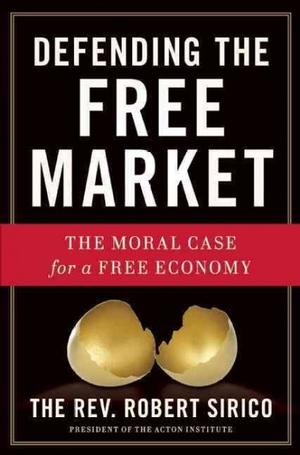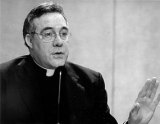 Is there a “moral” case for free markets, where governments don’t pick winners and losers and bailouts are forbidden? Robert A.Sirico says there is in a very provocative book entitled “Defending the Free Market: The Moral Case for a Free Economy” (Regnery, 256 pages, notes, index, suggestions for further reading at the end of each chapter). If he sounds like a minister preaching a sermon, he’s entitled since he’s been a Roman Catholic priest since 1989.
Is there a “moral” case for free markets, where governments don’t pick winners and losers and bailouts are forbidden? Robert A.Sirico says there is in a very provocative book entitled “Defending the Free Market: The Moral Case for a Free Economy” (Regnery, 256 pages, notes, index, suggestions for further reading at the end of each chapter). If he sounds like a minister preaching a sermon, he’s entitled since he’s been a Roman Catholic priest since 1989.
It was a long and winding road for Sirico, born to an Italian-American family in Brooklyn in 1951. (His older brother is actor Tony Sirico, who played Paulie Walnuts in the HBO series “The Sopranos”).
Moving to California in the 1970s he became a leftist, with pals like Jane Fonda and Tom Hayden. In a telephone interview he told me he never was a radical, but was in step with the socialist agenda of the left-wing of the Democratic Party. He emphasized in the interview that he doesn’t like labels, but said that he pretty much follows the principles of the Austrian School of free market economics advocated by F.A. Hayek in “The Road to Serfdom” and Ludwig von Mises (1881-1973) in his many books.
While living in Los Angeles he campaigned for Tom Hayden — then the husband of Jane Fonda — in the 1976 California primary against incumbent Sen. John Tunney. In a chapter that will warm the hearts of recovering leftists (Chapter 1: “A Leftist Undone”) Father Sirico describes his experiences in the New Left and how he managed — to the dismay of his left-wing friends — to find his way back to his birth Catholicism.
How can one make a “moral” case for capitalism? Wasn’t it discredited in the economic meltdown of 2007-2008, when long-standing financial institutions that were the bedrock of the capitalist system went under or were rescued by the infusions of taxpayer funds, where the U.S. government under both Bush 43 and Obama decided it was necessary to bail out Chrysler and General Motors, when unemployment soared and millions of homeowners lost their homes in foreclosure and where many others owed more on their homes than they were worth?
Yes, Father Sirico argues, there are problems with capitalism and consumerism, which fueled the housing boom and almost unrestrained spending. Yes, he argues, consumerism is an appalling spectacle, with Americans glutting themselves on all kinds of excess, while people in the developing world starve. The rich seem to be hogging far more than their share of the worlds resources. Free markets may be efficient, but are they fair? Aren’t there some things—life-saving health care, for example—that we cant’ afford to leave to the vicissitudes of the market?
He argues that the unrestrained socialism practiced by countries like Greece and most of the Eurozone countries has been discredited. Countries as diverse as France, Spain and Italy can no longer afford welfare states. The totalitarian states of the twentieth century have collapsed. And we beneficiaries of the globalized world economy are grateful that we enjoy plentiful food, clothing, shelter—and cheap electronics.
When I asked him how a moral case can be made for capitalism, Sirico said a free economy — necessarily including private property, legally enforceable contracts, and prices and interest rates freely agreed to by willing parties to transactions (not set by government bureaucrats) — is the best way to meet society’s material needs — from basic nutrition to sophisticated health care technology. Well-intentioned activists who seek to enlarge the state’s economic role are only killing the goose that laid the golden egg. The fact is, private enterprise in the free market has lifted millions out of dire poverty — far more people than state welfare or private charity have ever rescued from want.
In an interview with FrontPageMag’s Bill Steigerwald, a former colleague of mine at the Los Angeles Times, Sirico was asked whether capitalism and Christianity were natural enemies. Sirico answered: “I don’t think capitalism is a natural enemy of Christianity. Capitalism is really an inadequate word; it only describes one dimension of what is really human freedom and choice in the economic sphere. Choice is morally neutral. It’s the chooser who can be moral or immoral, not the ability to make the choice.”
Sirico argues that a free economy isn’t just by far the most efficient way of producing the largest amount of goods and services for the world’s population; economic freedom is also an indispensable support to the other freedoms we prize—such as freedom of speech and freedom of religion. The right to economic freedom doesn’t make things more important than people—just the reverse. Its only if we have economic rights that we can effectively protect ourselves from government encroachment into the most private areas of our lives—right down to our consciences.
As governments across the globe continue to act with unprecedented irresponsibility—burdening the creators of wealth with ever more regulation and borrowing colossal sums of money just as populations are set to decline precipitately—our prosperity, our economic freedom, and our most basic rights are threatened. The comfortable lifestyles and plentiful goods we take for granted are at risk. But so is the liberty whose source is found in our inherent dignity as human beings, endowed by our Creator with unalienable rights. Father Sirico sounds a timely warning—and reveals the principles that must be the basis for the recovery of our freedoms.
But can any moral person really be for capitalism? Isn’t there a place for a government safety net — Social Security and Medicare, for instance, I asked? Father Sirico chided my self-described “cafeteria libertarianism” saying that my support of Medicare — which provides health insurance for me and my wife, and for which we each pay almost $100 a month in premiums — is “outside the cafeteria.” I told him that he sounds like my anti-Medicare congressman, a physician and a member of House of Representatives — and a presidential candidate — Ron Paul (R-TX-14). He said there is no need for Medicare — let alone my view that the program should be opened up to all comers, widening the “risk pool” — since private insurance companies can perform the same function.
In Defending the Free Market you will learn:
* Why a free market system and economic freedom ensures that other freedoms we prize—including freedom of speech, freedom of religion, and individual liberty—are guaranteed
* How private enterprise has lifted millions out of dire poverty and starting a business is the best way to help the poor—not welfare
* Why the free market is not only the best way to ensure individual success and national prosperity, but how it actually promotes charity, selflessness, and kindness
* How Father Sirico, a reformed leftist and former colleague of Jane Fonda and Tom Hayden, discovered the merits of a free economy
Whether you agree with Sirico or not — and as I’ve indicated, I don’t agree with all of his views — “Defending The Free Market” will enlighten you on the intersection of free markets and freedom in general.
About the Author
 The Rev. Robert A. Sirico has been active in public policy affairs for more than thirty years. He co-founded the Acton Institute for the Study of Religion and Liberty in 1990. Father Sirico regularly lectures both in this country and around the world, and his writings have appeared in various publications, including the Wall Street Journal, Forbes, National Review, the London Financial Times, Crisis Magazine, and The New York Times. Raised in a Catholic family in Brooklyn, by his early teenage years he had left the Church. He received an associate’s degree from Los Angeles City College, studied at St. Mary’s University College, London, and received a bachelor’s degree in English from the University of Southern California. While in California, during the early 1970s, he served as a Pentecostal preacher and promoted left-wing politics, but after a time he began to realize he did not agree with the principles of socialism. A deeper study of the human person led to his return to the Catholic Church in 1977, and later the writings of St. Augustine and the biography of Blessed John Henry Newman moved him consider the priesthood. He received an M.Div. from The Catholic University of America in 1987 and was ordained a Paulist priest in 1989. He was assigned to the Catholic Information Center in Grand Rapids, Michigan.
The Rev. Robert A. Sirico has been active in public policy affairs for more than thirty years. He co-founded the Acton Institute for the Study of Religion and Liberty in 1990. Father Sirico regularly lectures both in this country and around the world, and his writings have appeared in various publications, including the Wall Street Journal, Forbes, National Review, the London Financial Times, Crisis Magazine, and The New York Times. Raised in a Catholic family in Brooklyn, by his early teenage years he had left the Church. He received an associate’s degree from Los Angeles City College, studied at St. Mary’s University College, London, and received a bachelor’s degree in English from the University of Southern California. While in California, during the early 1970s, he served as a Pentecostal preacher and promoted left-wing politics, but after a time he began to realize he did not agree with the principles of socialism. A deeper study of the human person led to his return to the Catholic Church in 1977, and later the writings of St. Augustine and the biography of Blessed John Henry Newman moved him consider the priesthood. He received an M.Div. from The Catholic University of America in 1987 and was ordained a Paulist priest in 1989. He was assigned to the Catholic Information Center in Grand Rapids, Michigan.
Source: Huntington News
Buy the book at AMAZON here.











Discussion
No comments for “Book Review: “Defending the Free Market: The Moral Case for a Free Economy” by Rev. Robert Sirico – David M. Kinchen”